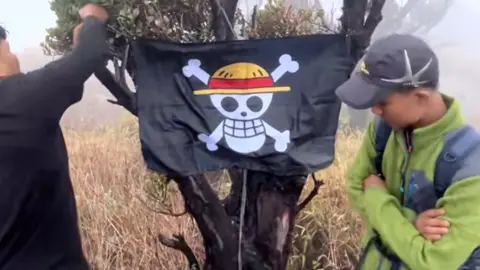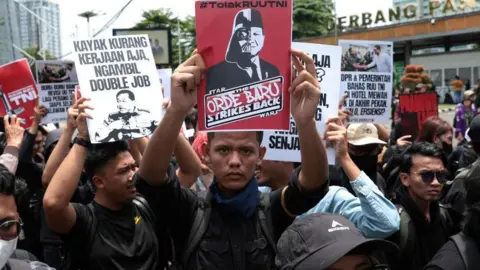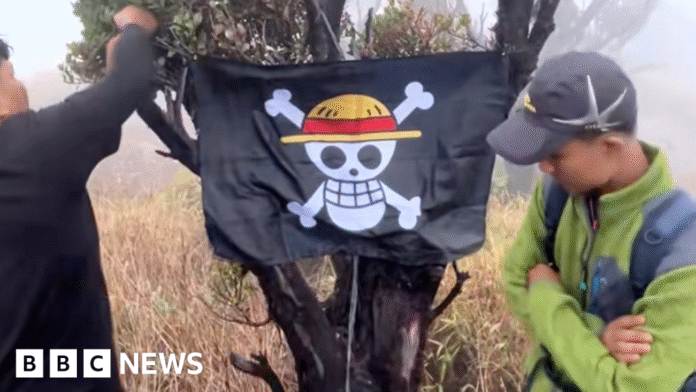BBC News, Singapore
 BBC
BBCIn the popular Japanese anime One Piece, black flags bearing a skull with a straw hat are carried by a rowdy crew of pirates who have made it their mission to challenge a draconian regime and fight for freedom.
But in July, these emblems started popping up across Indonesia – along doorways, on the backs of cars, and painted on walls.
For many, it was a response to Indonesian leader Prabowo Subianto’s call for Indonesians to fly their national red and white flag ahead of the country’s Independence Day on 17 August.
Instead, many chose to raise these pirate flags – known as a Jolly Roger – as a symbol of their discontent, with many criticising what they say is an increasingly centralised government led by Prabowo.
But the movement has not been well received by all. Earlier last week, the country’s Deputy House Speaker criticised the flag displays, calling it an “attempt to divide the nation”. Another lawmaker even suggested it could be treason.
One Piece, was first published in 1997 as a manga by Eiichiro Oda, is one of the most popular franchises in the world. The manga has sold more than 520 million copies while the TV series has run for more than 1,100 episodes.
The series has a large and dedicated fan base in Indonesia, where Japanese anime is well loved.
In the same way the pirates in the series, led by their leader Monkey D Luffy, raise the Jolly Rogers as a symbol of freedom against their government, some Indonesian residents say raising the flag is a “symbol that we love this country, but don’t completely agree with its policies”.
The anime reflects the injustice and inequality that Indonesians experience, said Ali Maulana, a resident of Jayapura city in the Papua province.
“Even though this country is officially independent, many of us have not truly experienced that freedom in our daily lives,” he told BBC Indonesian.
For him and many others, the decision to fly the flag was a response to a speech given by President Prabowo in late July.
“Raise the red and white flag wherever you are. Red represents the blood shed for our independence, white represents the purity of our souls,” Prabowo had said.
Dendi Christanto, who owns the Wik Wiki apparel store in Central Java, said he has received “thousands of orders” for the flags following the president’s speech.
“Since the end of July, I received hundreds of orders a day from all over Indonesia,” Dendi told news outlet Jakarta Post.
Some top officials however, have been less than impressed.
Deputy House Speaker Sufmi Dasco Ahmad, widely regarded as Prabowo’s right-hand man, described the movement as “a coordinated attempt to divide the nation”.
“We must collectively resist such actions,” he had said earlier last week.
Another lawmaker from the centre-right Golkar Party, Firman Soebagyo, suggested that displaying these flags could even amount to treason.
But on Tuesday, the country’s state secretary minister Prasetyo Hadi said the president himself had “no objection” to the flags as a form of “creative expression”.
“However, it should not be used to challenge or diminish the significance of the red and white flag. The two should not be placed side by side in a way that invites comparison or conflict,” his office said in a statement.
In Indonesia, there are no laws that restrict the display of fictional flags, but the law stipulates that if they are flown alongside the red-and-white national flags, the country’s flag must always be hoisted higher.
Police in the capital Jakarta have said they are “monitoring the use of non-national flags and symbols that don’t align with the spirit of nationalism, including pirate or fictional-themed flags”.
 EPA
EPA‘A cartoon flag as a threat to national security’
Indonesia’s hard-won democracy, the third largest in the world, has faced growing challenges in recent years.
Its popular former leader Joko Widodo rose to power as a promising democrat, but his one-of-us image lost some of its sheen towards the end of his second term, when he revived the death penalty for drug traffickers and appointed Prabowo, a controversial ex-general, as his defence minister.
Public frustration has intensified since Prabowo took over as president last October. In February, thousands took to the streets to protest budget cuts and legislative changes that would allow the military to take a bigger role in government.
“The red-and-white flags are too sacred for us to raise now,” said one user on Instagram, in a post that has been widely shared.
And while some lawmakers have criticised the display of the Jolly Rogers, others say they accept it as a form of public expression.
They are a way for people to “convey their expectations”, said Deputy Home Affairs Minister Bima Arya Sugiarto. “Such a form of expression is a natural phenomenon in a democracy.”
“This kind of symbolic action is better than street protests that could turn violent,” said Deddy Yevri Sitorus from the opposition Democratic Party of Struggle.
Because of One Piece’s popularity among Indonesians of all ages, the flags have offered a way to “raise awareness around political issues in a different and unique way”, said Dominique Nicky Fahrizal, a researcher at the Center for Strategic and International Studies.
And for some Indonesians, the government’s mixed response to the Jolly Roger underscores the symbol’s power.
“By treating a cartoon flag as a threat to national security, they have inadvertently validated the entire premise of the protest,” Farhan Rizqullah wrote on the Medium publishing platform.
“They have shown that the dream of Monkey D Luffy, the simple, unwavering desire to be free, is the one thing they truly fear.”
Additional reporting by Arie Firdaus in Jakarta and Muhammad Ikbal Asra in Jayapura





